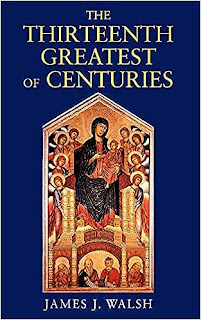The Greatest of Centuries? Certainly not the 20th, perhaps the bloodiest in human history! Nor the 21st, which so far seems steeped if not in blood then certainly in carnage created by technology and fostered by seemingly unbridgeable human divisions!
In the era and subculture in which I was first formed, however, there would have been no doubt which century was greatest. In my mid-century childhood, in the narrow provincial world of American Catholic culture, the influence of a certain medieval ideal (fed by 19th-century romanticism and by Pope Leo XIII's neo-scholastic revival) was immense. Hence, James J. Walsh's then popular book, The Thirteenth Greatest of Centuries (NY: Catholic Summer School Press, 1907), which this long hot summer has inspired me to recall, revisiting the popular 20th-century Catholic cultural and political project of a revived Christendom. As Church historian Joseph A. Komonchak once wrote: "For a model of its political and cultural project, the Church turned to its own history and found it, not in the state religion of the ancien régime, nor in the Counter-Reformation, but in an idealized Middle Ages" ["Modernity and the Construction of Roman Catholicism," Cristianesimo nella storia, 18 (1997): 353-385, p. 361].
In addition to all the obvious things to applaud about the Christendom of the High Middle Ages (e.g., Saint Thomas Aquinas, Saint Louis IX, the greatest Latin hymns, the universities), Walsh - perhaps unsurprisingly given the era in which he was writing - also reflects a certain "whiggish" view of history, which celebrates the development of liberal democratic institutions, organically traceable in important respects to high medieval developments. Whatever the merits and demerits of whiggish historiography, it is not integralism. The post-Enlightenment romantic medievalism that might have inspired one to want to read a book called The Thirteenth Greatest of Centuries certainly served as an antidote to Enlightenment liberalism, but in actual practice probably aspired more to a purification of the present than a return to the past.
Of course, whig history has its own problems, which is its own discussion. So does uncritical romantic medievalism. Putting aside the obvious fact that most (if not all) of us would infinitely prefer to live in a world with electricity and indoor plumbing, not to mention antibiotics and vaccines, no matter how much one looks longingly back at Christendom, there is no going back. One need not embrace either a whiggish philosophy of liberal historical progress or a Marxist materialist dialectic to recognize that historical change is largely irreversible.
If at times a somewhat superficial reading of Servant of God Isaac Hecker (1819-1888) might suggest an excessively celebratory appreciation of 19th-century American democracy and a somewhat too easy reconciliation of Catholicism and modernity, nonetheless his overall interpretation of what was happening in the world and its challenge for the Church represented (while committed to remaining faithful to the Church's true calling) a real alternative both to a reactionary integralism that would have wished to return to pre-revolutionary absolutism and to a romantic medievalism that would have wished to recover an only partly historical, idealized, gemeinshaftlich Christendom, to which it is inevitably impossible to return.
The key, of. course, is remaining faithful to the Church's true calling, which must inevitably transcend any century, however great. The more alienated from modernity one feels oneself to be, the more extreme will be one's condemnation of the actual present and the more extreme the search for an alternative Christendom, usually identified with some increasingly idealized past. On the other hand, the more willing one is to identify some authentic values in the present, the more able and likely one will be to enable a bridge between that Christian calling and participation in modernity, thereby becoming, what Charles Taylor has memorably called "modern civilization's 'loyal opposition'."


No comments:
Post a Comment